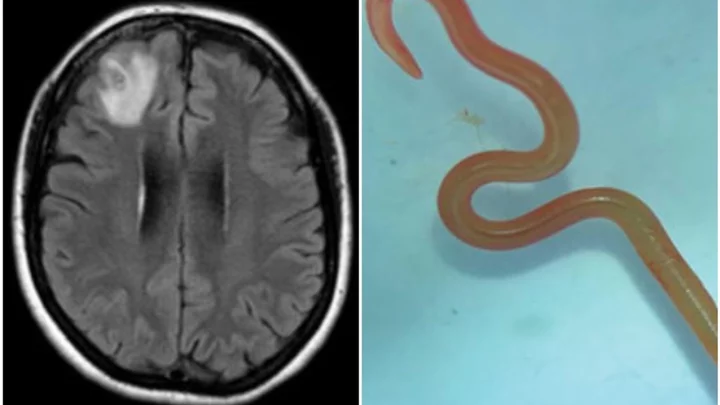A worm has been found living inside a woman’s brain, in a horror-movie-style world first.
Doctors in Canberra, Australia, were left stunned after they pulled the 8cm (3in) parasite from the patient’s damaged frontal lobe tissue during surgery last year.
"Everyone [in] that operating theatre got the shock of their life when [the surgeon] took some forceps to pick up an abnormality and the abnormality turned out to be a wriggling, live 8cm light red worm," said infectious diseases doctor Sanjaya Senanayake, according to the BBC.
"Even if you take away the yuck factor, this is a new infection never documented before in a human being."
Senanayake and his colleagues believe the parasite could have been in there for up to two months.
The patient, a 64-year-old woman from New South Wales, was first admitted to her local hospital in late January 2021 after suffering three weeks of abdominal pain and diarrhoea, followed by a constant dry cough, fever and night sweats, The Guardian reports.
By 2022, her symptoms extended to forgetfulness and depression, and she was referred to Canberra Hospital, where an MRI scan of her brain revealed “abnormalities” that required surgery.
“The neurosurgeon certainly didn’t go in there thinking they would find a wriggling worm,” Senanayake told the paper. “Neurosurgeons regularly deal with infections in the brain, but this was a once-in-a-career finding. No one was expecting to find that.”
The team at the hospital sent the worm to an experienced parasite researcher who identified it as an Ophidascaris robertsi.
This type of roundworm is commonly found in carpet pythons – non-venomous snakes that are ubiquitous across much of Australia.
Writing in the journal Emerging Infectious Diseases, Mehrab Hossain, a parasitologist, said she suspected that the patient became an "accidental host" to the worm after cooking with foraged plants.
The 64-year-old was known to have often collected native grasses from around her lakeside home, Senanayake told The Guardian.
He and his co-workers have concluded that the woman was probably infected after a python shed eggs from the parasite via its faeces into the grass. By touching the plants, she may then have transferred the eggs into her own food or kitchen utensils.
Fortunately, the unlucky and unique patient is said to be making a good recovery.
However, Senanayake told the BBC that her case should serve as an important warning to society more broadly.
"It just shows as a human population burgeons, we move closer and encroach on animal habitats. This is an issue we see again and again, whether it's Nipah virus that's gone from wild bats to domestic pigs and then into people, whether its a coronavirus like Sars or Mers that has jumped from bats into possibly a secondary animal and then into humans,” he said.
"Even though Covid is now slowly petering away, it is really important for epidemiologists… and governments to make sure they've got good infectious diseases surveillance around."
Sign up for our free Indy100 weekly newsletter
Have your say in our news democracy. Click the upvote icon at the top of the page to help raise this article through the indy100 rankings.

